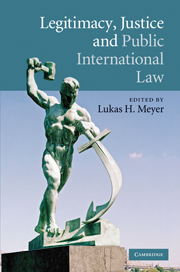Book contents
- Frontmatter
- Contents
- List of contributors
- Acknowledgements
- Introduction: Legitimacy, justice and public international law. Three perspectives on the debate
- 1 The legitimacy of global governance institutions
- 2 Institutionalising global demoi-cracy
- 3 The responsibilities and legitimacy of economic international institutions
- 4 Do international organisations play favourites? An impartialist account
- 5 ‘Victors’ justice'? Historic injustice and the legitimacy of international law
- 6 International law and global justice
- 7 Global justice: Problems of a cosmopolitan account
- 8 The responsibility to protect human rights
- 9 The threat of violence and of new military force as a challenge to international public law
- 10 Forcing a people to be free
- Index
- References
Introduction: Legitimacy, justice and public international law. Three perspectives on the debate
Published online by Cambridge University Press: 03 May 2010
- Frontmatter
- Contents
- List of contributors
- Acknowledgements
- Introduction: Legitimacy, justice and public international law. Three perspectives on the debate
- 1 The legitimacy of global governance institutions
- 2 Institutionalising global demoi-cracy
- 3 The responsibilities and legitimacy of economic international institutions
- 4 Do international organisations play favourites? An impartialist account
- 5 ‘Victors’ justice'? Historic injustice and the legitimacy of international law
- 6 International law and global justice
- 7 Global justice: Problems of a cosmopolitan account
- 8 The responsibility to protect human rights
- 9 The threat of violence and of new military force as a challenge to international public law
- 10 Forcing a people to be free
- Index
- References
Summary
In this introduction, we attempt to elucidate three theoretical perspectives that are helpful in framing the contributions to this volume. In the course of this elucidation we also attempt to indicate some important problems that the debate currently faces. We do this through discussions of international legitimacy, international justice and the relations between ideal and non-ideal theory.
International legitimacy. From normative authority by consent to instrumental legitimacy
Questions of legitimacy have long been central to both political philosophy and political practice. It is not merely vanity that leads dictators of virtually all stripes to first decide to hold elections and then announce that they have won 96 per cent of the vote in them. Saddam Hussein, for instance, held a referendum in 2002 on whether he should continue as ruler of Iraq for the next seven years, and after the election was held it turned out that out of 11,445,638 eligible voters, every single one voted in favour. The natural question to ask is: why bother? Why bother to hold sham elections with sham results when you hold power anyway? There are many possible answers, but two are especially relevant here. The effect of legitimacy is, or can be, twofold. First, it makes it easier to exercise the power one does possess. Second, and as important, it can often increase the scope of the power one possesses.
- Type
- Chapter
- Information
- Legitimacy, Justice and Public International Law , pp. 1 - 28Publisher: Cambridge University PressPrint publication year: 2009
References
- 4
- Cited by

